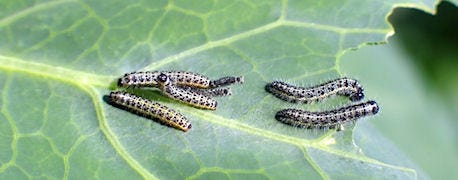
The mild winter and warmer than normal weather this spring have resulted in insects becoming active several weeks earlier than usual. Lady beetles, flies and other insects are already showing up both in town and on the farm. Iowa State University Extension specialists have trapped black cutworm moths for a couple of weeks now. Alfalfa weevil hatch is happening throughout most of the state as well.

Crop Insects Are Showing Up Early In Iowa
What does this early activity mean in terms of insect management later on in the growing season? "I'm not sure," says Erin Hodgson, ISU Extension entomologist. "I'm probably most concerned about the moisture level needed to keep plants healthy and growing. Extremely dry weather can intensify insect feeding and result in damage later in the season. Other pests, such as spider mites, thrive in hot and dry weather."
Hodgson is strongly encouraging everyone to keep an eye out for insects during crop emergence and establishment this year. "We will likely have to pay closer attention to insects in case timely insecticide rescue treatments are needed compared to other summers," she says. Even if you use an insecticide seed treatment on the corn or soybean seed you plant, some insects may require a foliar insecticide application if their population gets high enough. "You do need to pay close attention to your fields as crops emerge and are getting established," she notes.
Black cutworm moth captures continue to occur in Iowa this spring
On March 20 ISU Extension crop specialists confirmed the first black cutworm moth trapped in Iowa this spring. It was in Muscatine County. Since then several other counties have also reported captures of this moth, which lays its eggs on weed seedlings in fields. The eggs hatch and develop into larvae (worm stage) and these worms can clip off corn plants. An insecticide treatment is required if the larvae reach the threshold for economic damage on young corn plants.
Adult moths were trapped in Lucan County on March 30, Des Moines County on March 30, Marion County on March 29 and Story County on March 31.
"We use these captures in our traps to start estimating the growing degree days that are needed for predicted cutting dates on corn," says Hodgson. "Normally predicted cutting dates happen in mid-May but they may be slightly earlier this year. I'm telling people to look for our predicted cutting dates for black cutworm on corn sometime later this month. We will release our predicted dates sometime later in April."
Black cutworm typically damages corn but can also feed on young soybean plants. Certain fields may be at higher risk for black cutworm damage than others. Low lying and poorly drained fields, next to areas of natural vegetation, as well as weedy fields, should be scouted first for signs of black cutworm activity.
New scouting "app" is available from Iowa State University
Developed by Iowa State University, the ScoutPro app for your smartphone, iPad or other tablet devices will allow you to identify all weeds, insects and diseases in your fields, while additionally creating crop scouting reports enabling you to make better management decisions. It is available through iTunes App Store. For more information, go to www.scoutpro.org/.
About the Author(s)
You May Also Like




